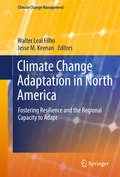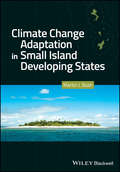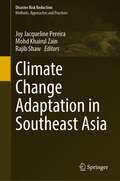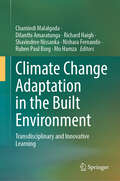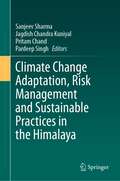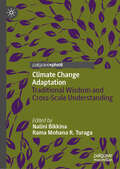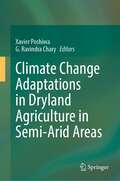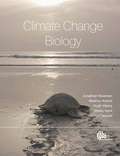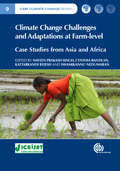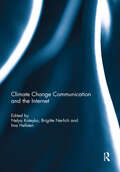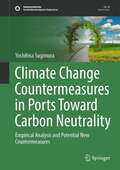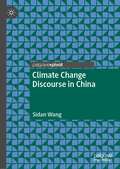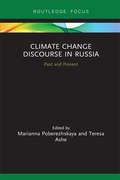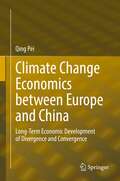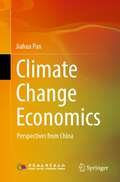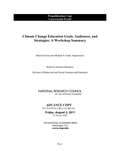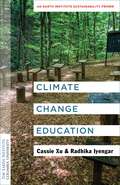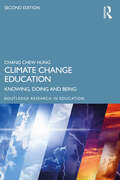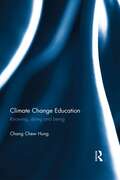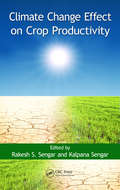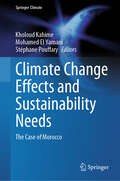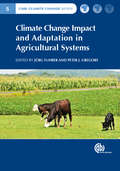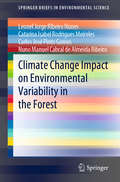- Table View
- List View
Climate Change Adaptation in North America: Fostering Resilience and the Regional Capacity to Adapt (Climate Change Management)
by Walter Leal Filho Jesse M. KeenanThis edited book responds to the need for a better understanding of how climate change affects North America and for the identification of processes, methods and tools that may help countries and communities to develop a more robust adaptive capacity. It showcases successful examples of how to manage the social, economic and environmental complexities posed by climate change. The book attempts to synthesize various branches of resilience and adaptation scholarship into a cohesive text that highlights field research and best practices that are shaping policy and practice in a wide geography from the coastal conditions of the Caribbean to the thawing landscape of the Arctic Circle.
Climate Change Adaptation in Small Island Developing States
by Martin J. BushA groundbreaking synthesis of climate change adaptation strategies for small island states, globally A wide ranging, comprehensive, and multi-disciplinary study, this is the first book that focuses on the challenges posed by climate change impacts on the Small Island Developing States (SIDS). While most of the current literature on the subject deals with specific regions, this book analyses the impacts of climate change across the Caribbean, the Pacific Ocean, and the African and Indian Ocean regions in order to identify and tackle the real issues faced by all the small island States. As the global effects of climate change become increasingly evident and urgent, it is clear that the impact on small islands is going to be particularly severe. These island countries are especially vulnerable to rising sea levels, hurricanes and cyclones, frequent droughts, and the disruption of agriculture, fisheries and vital ecosystems. On many small islands, the migration of vulnerable communities to higher ground has already begun. Food security is an increasingly pressing issue. Hundreds of thousands of islanders are at risk. Marine ecosystems are threatened by acidification and higher seawater temperatures leading to increased pressure on fisheries—still an important source of food for many island communities. The small island developing States emit only small amounts of carbon dioxide and other greenhouse gases. Yet many SIDS governments are allocating scarce financial and human resources in an effort to further reduce their emissions. This is a mistake. Rather than focus on mitigation (i.e., the reduction of greenhouse gas emissions) Climate Change Adaptation in Small Island Developing States concentrates on adaptation. The author assesses the immediate and future impacts of climate change on small islands, and identifies a range of proven, cost-effective adaptation strategies. The book: Focuses on the challenges of climate change faced by all of the world’s small island developing States; Provides comprehensive coverage of the latest research into the most likely environment impacts; Uses numerous case studies to describe proven, practical, and cost-effective policies, including disaster management strategies—which can be developed and implemented by the SIDS; Takes a unique, multidisciplinary approach, making it of particular interest to specialists in a variety of disciplines, including both earth sciences and life sciences. This book is a valuable resource for all professionals and students studying climate change and its impacts. It is also essential reading for government officials and the ministries of the 51 small island developing States, as well as the signatories to the 2015 Paris climate agreement.
Climate Change Adaptation in Southeast Asia (Disaster Risk Reduction)
by Rajib Shaw Joy Jacqueline Pereira Mohd Khairul ZainThis book highlights the current issues, challenges, and priorities for climate change adaptation in the ten member states of the Association of Southeast Asian Nations (ASEAN). The status of each country was prepared by a consortium of researchers in consultation with National Focal Points of the ASEAN Working Group on Climate Change (AWGCC). National documents on adaptation actions, including local scenario and priorities, were reviewed where available and supplemented with an assessment of scientific publications to identify vulnerable ecosystems and regions. Adaptation needs and priorities were determined through stakeholder consultation in the respective countries. This allows for local-level perspectives to be captured and brought to the attention of policy and decision-makers at the national and regional levels. An important lesson from this exercise is that universities and research institutions at the national level have a critical role to play in bridging the gap between science and policy in climate change adaptation. These institutions also have the capacity to continuously facilitate transfer of the best available science for advancing climate change adaptation at the local level.
Climate Change Adaptation in the Built Environment: Transdisciplinary and Innovative Learning
by Dilanthi Amaratunga Richard Haigh Mo Hamza Chamindi Malalgoda Shavindree Nissanka Nishara Fernando Ruben Paul BorgGlobal climate change is one of the greatest environmental threats facing humanity and it is affecting every country on every continent. Recent evidence confirms a close liaison between climate change induced hazards and the built environment, as the built environment demonstrates a high fragility and vulnerability to hazardous situations. The impact of climate change is particularly pertinent to the built environment given the life expectancy of buildings and the fact that it is essential to adapt the existing built environment to deal with a climate that may be significantly different from that in which it evolved. Coastal regions are highly vulnerable to climate change because, in addition to changes in temperature, precipitation, and more frequent flooding, they will be affected by rising sea levels, wave heights, and accelerated coastal erosion. The built environment exerts considerable influence over coastal communities' local climate and environment. Coastal areas also tend to be highly populated, with many vulnerable urban centres located near the coastal belt. In addressing such challenges, it is important to better understand the impacts of climate change on the built environment and to develop tangible climate adaptation measures for the built environment.
Climate Change Adaptation, Risk Management and Sustainable Practices in the Himalaya
by Sanjeev Sharma Pardeep Singh Jagdish Chandra Kuniyal Pritam ChandThis volume analyzes ecological and socio-economic risks due to climate change in the Himalayan mountain ecosystems, communities, and proposes adaptation strategies and sustainability practices. In order to better understand the potential actions required to improve natural resource conservation and the development of mountain people's livelihoods. The authors discuss the current status of local knowledge system on various environmental aspects of conservation and sustainable use of mountain resources in the Himalaya. The book addresses the institutional capacities, gaps, and priority areas of capacity building to strengthen policies and governance in regard to climate change, landuse management, biodiversity conservation, and sustainable management in the Himalayan region. The aim of this book is to enhance coordination building among policymakers, planners, mountain communities to foster collaboration between different stakeholders by understanding local perceptions of climate change as well as variability issues, and establishing adaptation strategies to cope with these impacts. The chapters incorporate theoretical and applied aspects, and may serve as baseline information for the sustainability of mountain ecosystems through the contribution of multidisciplinary and interdisciplinary expertise from the Himalayan region. The book will be useful for students, teachers, and researchers working in different areas pertaining to mountain ecosystems, as well as policymakers and planners working on issues related to the sustainability of the mountain ecosystem.
Climate Change Adaptation: Traditional Wisdom and Cross-Scale Understanding
by Nalini Bikkina Rama Mohana R. TuragaThis book discusses how climate change needs to be anchored in indigenous knowledge with reference to resource management, infrastructure, livelihoods, and social institutions, with a unique focus on risks and provenances of resilience available to the local communities. Beyond the scientific know-how on climate change, this volume highlights traditional wisdom, which through its hands-on learning plays a crucial role in amalgamation with cross-scale understanding. It documents the deliberations of a seminar that brought together traditional wisdom and cross-scale understanding of academicians, researchers, practitioners, and grassroots functionaries directly or indirectly working with communities in the area of climate change adaptation and thereby brings together adaptation and allied practices from across a spectrum of specialties and practitioner contexts. It discusses several insights and novel practices and is purported to provide significant research and policy implications in the spirit of thinking globally but acting locally.
Climate Change Adaptations in Dryland Agriculture in Semi-Arid Areas
by G. Ravindra Chary Xavier PoshiwaThis book highlights the approaches for achieving trans-disciplinary research integration for “semi-arid dryland agriculture systems” under changing climates, while also identifying the elements of a collaborative research agenda that are needed to advance global food security. The book emphasizes climate change being a reality and how drylands are bearing the brunt in diverse ways. The major impact of dryland agriculture is on communities that need to: avoid the short- and long-term impacts of the changing climate; adapt strategies that can minimize these impacts; and be able to mitigate climate change, for which they need climate smart interventions. These interventions are only realized through knowledge and experience sharing among stakeholders from different sectors and backgrounds. It is in this context that the publication was seen as a necessity in order to bring together ideas that will transform lives and build adaptation capacities, thereby providing the much-needed products in communities leading to development
Climate Change Biology
by Madhur Anand Ze'Ev Gedalof Jonathan Newman Shelley Hunt Hugh HenryClimate change has moved from being a contested phenomenon to the top of the agenda at global summits. Climate Change Biology is the first major textbook to address the critical issue of how climate change may affect life on the planet, and particularly its impact on human populations. Presented in four parts, the first deals extensively with the physical evidence of climate change and various modelling efforts to predict its future. Biological responses are addressed in the second part, from the individual's physiology to populations and ecosystems, and further to considering adaptation and evolution. The third part examines the specific impact climate change may have on natural resources, agriculture and forestry. The final part considers research on the cutting edge of impact prediction and the practical and philosophical limitations on our abilities to predict these impacts. This text will be a useful asset to the growing number of both undergraduate and graduate courses on impacts of climate change, as well as providing a succinct overview for researchers new to the field.
Climate Change Challenges and Adaptations at Farm-level
by Kattarkandi Byjesh Naveen P Singh Swamikannu Nedumaran Cynthia BantilanThis book emphasis the role of farm level adaptation as a key in developmental pathways that are challenged by climate risks in the semi-arid tropics of Asia and Africa. It throws light on key issues that arise in farm level impacts, adaptation and vulnerability to climate change and discusses Q2 methodological approaches undertaken in study domains of Asia and Africa. The book systematically describes the perceptions, aspirations as elicited/voiced by the farmers and identifies determinants of adaptation decisions. Chapters identify constraints and opportunities that are translated into indicative intervention recommendations towards climate resilient farm households in the semi-arid tropics of Asia and Africa. Furthermore, it discusses with evidences that contributes to the development of livelihood strategy for poor farmers in Asia (Bangladesh, India, Sri Lanka, Thailand, Vietnam and China) and Africa (Burkina Faso, Niger, Kenya and Ghana).
Climate Change Challenges and Adaptations at Farm-level: Case Studies from Asia and Africa (CABI Climate Change Series)
by Kattarkandi Byjesh Swamikannu Nedumaran Cynthia Bantilan Naveen Prakash SinghThis book emphasis the role of farm level adaptation as a key in developmental pathways that are challenged by climate risks in the semi-arid tropics of Asia and Africa. It throws light on key issues that arise in farm level impacts, adaptation and vulnerability to climate change and discusses Q2 methodological approaches undertaken in study domains of Asia and Africa. The book systematically describes the perceptions, aspirations as elicited/voiced by the farmers and identifies determinants of adaptation decisions. Chapters identify constraints and opportunities that are translated into indicative intervention recommendations towards climate resilient farm households in the semi-arid tropics of Asia and Africa. Furthermore, it discusses with evidences that contributes to the development of livelihood strategy for poor farmers in Asia (Bangladesh, India, Sri Lanka, Thailand, Vietnam and China) and Africa (Burkina Faso, Niger, Kenya and Ghana).
Climate Change Communication and the Internet
by Nelya Koteyko, Brigitte Nerlich and Iina HellstenThe volume provides a timely, state of the art collection of studies examining climate change communication in the era of digital media. The chapters focus on a broad range of topics covering various aspects of both practice and research in climate change communication, ranging from the use of online platforms, to blogs, and social networking sites. Climate change communication has increasingly moved into Internet-based forums, and this volume provides a comprehensive overview of research into Internet and climate change communication. The studies share valuable methodological insights in this relatively new field of research and shed light on the opportunities and challenges underlying the collection and analysis of online climate change-related data. This book was previously published as a special issue of Environmental Communication.
Climate Change Countermeasures in Ports Toward Carbon Neutrality: Empirical Analysis and Potential New Countermeasures (Sustainable Development Goals Series)
by Yoshihisa SugimuraThis book presents an in-depth examination of the challenges facing the port industry in reducing CO2 emissions. Through empirical studies and real-world data, it explores the energy consumption of cargo handling machinery and reefer containers, and introduces new technologies and methods for reducing emissions. With a focus on practical application, the book provides a valuable resource for port managers and stakeholders looking to implement effective climate change countermeasures. It also serves as a valuable resource for researchers studying ports and climate change.
Climate Change Discourse in China
by Sidan WangThis book focuses on the politics, discourse and actors surrounding climate change issues in China. This framework offers a new way of observing Chinese discourses around climate change. Discursive changes in coal consumption and air pollution have been raised to uncover the various motivations of China towards addressing climate issues. This book will be of interest to a variety of different stakeholders including policy-makers, non-state actors, business communities and media, and anyone who are interested in the climate governance of China.
Climate Change Discourse in Russia: Past and Present (Routledge Focus on Environment and Sustainability)
by Marianna Poberezhskaya Teresa AsheThis book explores the development of climate change discourses in Russia. It contributes to the study of climate change as a cultural idea by developing the extensive Anglophone literature on environmental science, politics and policy pertaining to climate change in the West to consider how Russian discourses of climate change have developed. Drawing on contributors specialising in numerous periods, regions, disciplines and topics of study, the central thread of this book is the shared attempt to understand how environmental issues, particularly climate change, have been understood, investigated and conceptualised in Soviet and post-Soviet Russia. The chapters aim to complement work on the history of the discursive political construction of climate change in the West by examining a highly contrasting (but intimately related) cultural context. Russia remains one of the world’s largest greenhouse gas emitters with one of the most carbon-intensive economies. As the world begins to suffer the extreme consequences of anthropogenic climate change, finding adequate solutions to global environmental problems necessitates the participation of all countries. Russia is a central actor in this global process and it, therefore, becomes increasingly important to understand climate change discourse in this region. Insights gained in this area may also be illuminating for examining environmental discourses in other resource rich regions of the world with alternative economic and political experiences to that of the West (e.g. China, Middle East). This book will be of great interest to students and scholars of Russian environmental policy and politics, climate change discourses, environmental communication and environment and sustainability in general.
Climate Change Economics between Europe and China: Long-Term Economic Development of Divergence and Convergence
by Qing PeiThis book is the first attempt to highlight the Great Divergence between Europe and China from the perspective of environmental change. The author discusses the agrarian economy while considering the effects of climate change in both Europe and China at a long-term scale. The findings in the book supplement current knowledge and discussion on the Great Divergence across Eurasia. The book further aims to empirically review the climatic impacts on the human community in the past as the relevant historical reference by which to understand human–nature linkages in the current Anthropocene epoch. The statistical analysis in the book will contribute to the development of relevant subjects, such as environmental humanities, quantitative history, and historical geography. The book thus is suitable to all levels of students, undergraduate and postgraduate, in the university. In summary, by combining multiple disciplines in both methods and knowledge, this book becomes an interesting reference to students, academic staff, and even the general public. It may also appeal to policymakers, who aim to address the impacts of climate change according to past societal experiences.
Climate Change Economics: Perspectives from China
by Jiahua PanThis book establishes theories and methods of climate change economics based on the perspective of human development. The book, in two volumes, consists of papers and research reports authored by Pan Jiahua or researchers under his guidance. Professor Pan Jiahua is a leading figure in the field of political economy in climate change and has written extensively. The book is divided into four parts, covering theories, methods, governance, and policies. • The theory part includes the general economics of climate change, the political economy of climate change, carbon emissions, and human development. • The method part covers the economic analysis of greenhouse gas reduction and economics of low-carbon economic development. • The governance is on the design and construction of international climate regimes and China's role and choice. • Finally, the policy part consists of three chapters: policy choices for low-carbon transformation, energy-saving emission reduction, and low-carbon development and adaptation to climate change. The disciplines involved in climate change economics include welfare economics, development economics, international political economics, and property rights economics. In the context of multidisciplinary cross-cutting, the economics of climate change has evolved. The book proposes theories, methods and offers policy solutions and cases. It is of high academic and empirical value for developing countries to strive for fair rights and interests in international climate negotiations, obtain development space, and pursue a low-carbon and ecological economy. Professor Jiahua Pan and his team at the Chinese Academy of Social Sciences have contributed greatly to the development of climate change economics in China. Their work has laid the foundation of climate change economics from basic concepts, frameworks, and systems and has a great significance in promoting the development of climate change economics.
Climate Change Education
by National Research Council Division of Behavioral and Social Sciences and Education Board on Environmental Change and Society Board on Science Education Michael A. Feder Sherrie ForestThe global scientific and policy community now unequivocally accepts that human activities cause global climate change. Although information on climate change is readily available, the nation still seems unprepared or unwilling to respond effectively to climate change, due partly to a general lack of public understanding of climate change issues and opportunities for effective responses. The reality of global climate change lends increasing urgency to the need for effective education on earth system science, as well as on the human and behavioral dimensions of climate change, from broad societal action to smart energy choices at the household level. The public's limited understanding of climate change is partly the result of four critical challenges that have slowed development and delivery of effective climate change education. As one response to these challenges, Congress, in its 2009 and 2010 appropriation process, requested that the National Science Foundation (NSF) create a program in climate change education to provide funding to external grantees to improve climate change education in the United States. To support and strengthen these education initiatives, the Board on Science Education of the National Research Council (NRC) created the Climate Change Education Roundtable. The Roundtable convened two workshops. Climate Change Education Goals, Audiences, and Strategies is a summary of the discussions and presentations from the first workshop, held October 21 and 22, 2010. This report focuses on two primary topics: public understanding and decision maker support. It should be viewed as an initial step in examining the research on climate change and applying it in specific policy circumstances.
Climate Change Education: An Earth Institute Sustainability Primer (Columbia University Earth Institute Sustainability Primers)
by Radhika Iyengar Luo Cassie XuClimate change affects every person and society, every community and industry. Education at all levels, in all disciplines, and both inside and outside official institutions must now address climate change and its many effects on social and environmental systems. This book provides a framework for putting climate change at the forefront of educational agendas and pedagogical tools for teaching climate science across local and global settings.Cassie Xu and Radhika Iyengar present evidence-based teaching practices and strategies that are grounded in a broad conception of education and emphasize a systems approach. They share examples of effective approaches in diverse learning environments—not just in classrooms and other formal settings but also informal contexts with communities and families. This book makes the case that students and other learners need to understand climate science and the physical and social impacts of climate change not only to be good citizens but also to be well prepared for different career paths. Xu and Iyengar highlight systemic barriers and inequalities, reflecting on how to bring marginalized voices and perspectives into educational spaces. Providing a foundation for interdisciplinary environmental education, this book underscores that how we teach future generations about climate change will shape our future.
Climate Change Education: Knowing, Doing and Being (Routledge Research in Education)
by Chang Chew HungClimate change is complex and there is a need to educate our future generations so that they are able to deal with the plethora of information and views that they come into contact with in their lives. This book inquires into what it means to teach and learn about climate change. Now in its second edition, Chang further explores what education for climate change entails, discussing the concept of climate change education (CCE) itself, how it is taught in schools and how public education is being carried out. Featuring updated literature in a quickly advancing field, the book defines CCE for the global citizen and looks at pedagogies supporting CCE. It also identifies teachers as key stakeholders in climate change discourse, how to improve teacher readiness on the topic and how teacher professional development can support successful implementation of CCE. This book will be invaluable to climate change educators and can act as a reference resource for teachers, education policymakers and public education agencies.
Climate Change Education: Knowing, doing and being (Routledge Research in Education)
by Chang Chew HungClimate change is a controversial topic; some people assert that climate change is not occurring, and others believe that reports are inaccurate, that whilst climate change is happening, it may not be caused by human activity. There are also climate alarmists who use IPCC reports to support their claims that erratic weather patterns are a result of climate change caused by human activity. Regardless of these different viewpoints, one fact can be agreed upon; climate change is a complex subject and there is a need to educate future generations, enabling them to deal with the plethora of information and views that they will experience in their lives. This book explores what education for climate change entails, discussing the concept of Climate Change Education (CCE) itself, how it can be taught in schools and how public education can be carried out. It instructs what specific subject matter to teach for CCE, and how to evaluate the student learning on the subject. Chapters include: CCE in the Formal Curriculum Teacher readiness for CCE Assessment for and of CCE Lessons from CCE for Public Education Climate Change Education is an extremely useful resource for anyone involved in educating students on climate change and also for those interested in climate change itself.
Climate Change Effect on Crop Productivity
by Rakesh S. Sengar Kalpana SengarExplore the Relationship between Crop and ClimateAgricultural sustainability has been gaining prominence in recent years and is now becoming the focal point of modern agriculture. Recognizing that crop production is very sensitive to climate change, Climate Change Effect on Crop Productivity explores this timely topic in-depth. Incorporating contri
Climate Change Effects and Sustainability Needs: The Case of Morocco (Springer Climate)
by Kholoud Kahime Mohamed El Yamani Stéphane PouffaryThis book provides simultaneously, a cross-sectoral, multi-scale assessment of climate change issues in Morocco and proposes levers of action and innovative practices to be used to strengthen the resilience and adaptation strategies. The book offers the opportunity to debate contemporary mutations, the paradigms of change as a complex process, the dynamics of values, the complexity of the issues and the opportunities for transformation, starting from a reflective approach on the historical, scientific, theoretical and strategic dimensions of action, creativity and environmental innovation in a perspective of sustainability.
Climate Change Impact and Adaptation in Agricultural Systems
by Pablo A Pablo A Robert J Robert J Julie Julie Temesgen Tadesse Temesgen Tadesse Heidi Heidi Anil Anil Elan Elan Kindie Kindie Ni’matul Ni’matul John F John F Rachmat Rachmat Phillip Phillip Uran Uran Markku Markku Henry Henry Frank Frank Kurniatun Kurniatun Jules Jules Jørgen E Jørgen E Clare Clare Jill Jill Bram Bram Meine Van Noordwijk P Gregory Brian Keating Mark Mark Laun W Laun W Himanshu Himanshu Jurg Fuhrer Fujiang Fujiang Chris Chris Catherine Catherine Betha Betha Jon Jon Steven Steven Serena Serena Richard Richard Reimund Reimund Helena Helena Kai Kai Pablo Pablo Alan Franzluebers Sika Sika Rachael A Rachael A Mark A Mark A Walter A Walter A H Matthew Reynolds Lauren Lauren Rosemary Rosemary Nele NeleThe focus of this book is future global climate change and its implications for agricultural systems which are the main sources of agricultural goods and services provided to society. These systems are either based on crop or livestock production, or on combinations of the two, with characteristics that differ between regions and between levels of management intensity. In turn, they also differ in their sensitivity to projected future changes in climate, and improvements to increase climate-resilience need to be tailored to the specific needs of each system. The book will bring together a series of chapters that provide scientific insights to possible implications of projected climate changes for different important types of crop and livestock systems, and a discussion of options for adaptive and mitigative management.
Climate Change Impact and Adaptation in Agricultural Systems (CABI Climate Change Series #15)
by Pablo A Pablo A Robert J Robert J Julie Julie Temesgen Tadesse Temesgen Tadesse Heidi Heidi Anil Anil Elan Elan Kindie Kindie Ni’matul Ni’matul John F John F Rachmat Rachmat Phillip Phillip Uran Uran Markku Markku Henry Henry Frank Frank Kurniatun Kurniatun Jules Jules Jørgen E Jørgen E Clare Clare Jill Jill Bram Bram Meine Van Noordwijk Brian Keating Mark Mark Laun W Laun W Himanshu Himanshu Fujiang Fujiang Chris Chris Catherine Catherine Betha Betha Jon Jon Steven Steven Serena Serena Richard Richard Reimund Reimund Helena Helena Kai Kai Pablo Pablo Alan Franzluebers Sika Sika Rachael A Rachael A Mark A Mark A Walter A Walter A H Matthew Reynolds Lauren Lauren Rosemary Rosemary Nele NeleThe focus of this book is future global climate change and its implications for agricultural systems which are the main sources of agricultural goods and services provided to society. These systems are either based on crop or livestock production, or on combinations of the two, with characteristics that differ between regions and between levels of management intensity. In turn, they also differ in their sensitivity to projected future changes in climate, and improvements to increase climate-resilience need to be tailored to the specific needs of each system. The book will bring together a series of chapters that provide scientific insights to possible implications of projected climate changes for different important types of crop and livestock systems, and a discussion of options for adaptive and mitigative management.
Climate Change Impact on Environmental Variability in the Forest (SpringerBriefs in Environmental Science)
by Leonel Jorge Nunes Catarina Isabel Meireles Carlos José Pinto Gomes Nuno Manuel de Almeida RibeiroThis book discusses the impact of climate change on rural forest areas. It analyses data provided by the Portuguese Institute of the Sea and Atmosphere (IPMA) to not only demonstrate that climate change has occurred in Portuguese forests, but also to suggest how forestry practices can be adapted to minimise its effects. In turn, the book distils data collected over several years into a comprehensive and coherent review of the ways in which the climate has changed in Portugal. It addresses the changes in rainfall, temperatures, and climatic anomalies, and how these changes correlate with effects such as rural forest fires. Though the text chiefly focuses on Portugal, the tools implemented are easily transferable to other countries and regions, making it relevant to readers around the globe. The book offers a valuable asset for students, researchers, foresters and those working at environmental (research) institutions.
